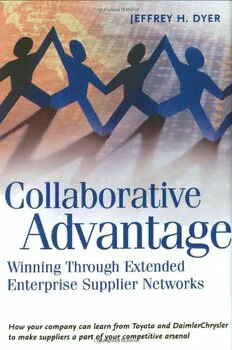Download Collaborative Advantage: Winning through Extended Enterprise Supplier Networks PDF Free - Full Version
Download Collaborative Advantage: Winning through Extended Enterprise Supplier Networks by Jeffrey H. Dyer in PDF format completely FREE. No registration required, no payment needed. Get instant access to this valuable resource on PDFdrive.to!
About Collaborative Advantage: Winning through Extended Enterprise Supplier Networks
Why has Chrysler been twice as profitable as GM and Ford during the 1990s even though it is a much smaller company with plants that are less efficient than Ford's? Why does Toyota continue to have substantial productivity and quality advantages long after knowledge of the Toyota Production System has diffused to competitors? The answer, according to Jeff Dyer, is that Toyota and Chrysler have been the first in their industry to recognize that the fundamental unit of competition has changed--from the individual firm to the extended enterprise. In this book Dyer demonstrates the power of collaborative advantage, arguing that, in the future, competitive advantage will increasingly be created by teams of companies, rather than by the single firm. Managers who do not recognize this development--regardless of their industry--are in danger of adopting the wrong strategies for their firms. Dyer draws on eight years of study of the automotive industry, including a wealth of data from interviews with over 200 executives and surveys of over 500 suppliers, as he offers detailed case studies of Toyota and Chrysler to show managers how to create collaborative advantage with their supplier networks. Dyer demonstrates how to build trust in the extended enterprise, how to exploit and manage knowledge (describing how Toyota manages knowledge across organizational boundaries), and how to create advantages through dedicated asset investments. In turn, these processes generate stunning performance advantages and an identity for the extended enterprise. To be successful in future years, executives will have to convert their corporations into fully integrated, extended enterprises. In Collaborative Advantage, Jeff Dyer shows them how.
Detailed Information
| Author: | Jeffrey H. Dyer |
|---|---|
| Publication Year: | 2000 |
| ISBN: | 9781423761136 |
| Pages: | 222 |
| Language: | English |
| File Size: | 11.559 |
| Format: | |
| Price: | FREE |
Safe & Secure Download - No registration required
Why Choose PDFdrive for Your Free Collaborative Advantage: Winning through Extended Enterprise Supplier Networks Download?
- 100% Free: No hidden fees or subscriptions required for one book every day.
- No Registration: Immediate access is available without creating accounts for one book every day.
- Safe and Secure: Clean downloads without malware or viruses
- Multiple Formats: PDF, MOBI, Mpub,... optimized for all devices
- Educational Resource: Supporting knowledge sharing and learning
Frequently Asked Questions
Is it really free to download Collaborative Advantage: Winning through Extended Enterprise Supplier Networks PDF?
Yes, on https://PDFdrive.to you can download Collaborative Advantage: Winning through Extended Enterprise Supplier Networks by Jeffrey H. Dyer completely free. We don't require any payment, subscription, or registration to access this PDF file. For 3 books every day.
How can I read Collaborative Advantage: Winning through Extended Enterprise Supplier Networks on my mobile device?
After downloading Collaborative Advantage: Winning through Extended Enterprise Supplier Networks PDF, you can open it with any PDF reader app on your phone or tablet. We recommend using Adobe Acrobat Reader, Apple Books, or Google Play Books for the best reading experience.
Is this the full version of Collaborative Advantage: Winning through Extended Enterprise Supplier Networks?
Yes, this is the complete PDF version of Collaborative Advantage: Winning through Extended Enterprise Supplier Networks by Jeffrey H. Dyer. You will be able to read the entire content as in the printed version without missing any pages.
Is it legal to download Collaborative Advantage: Winning through Extended Enterprise Supplier Networks PDF for free?
https://PDFdrive.to provides links to free educational resources available online. We do not store any files on our servers. Please be aware of copyright laws in your country before downloading.
The materials shared are intended for research, educational, and personal use in accordance with fair use principles.

